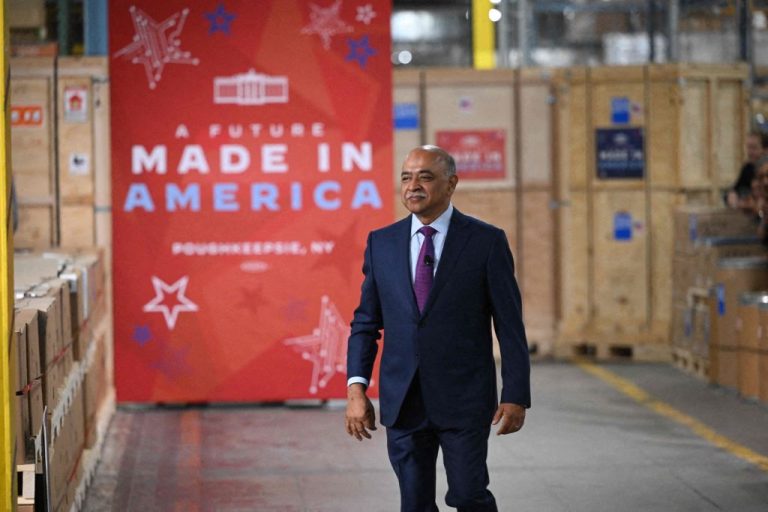One of America’s largest companies, IBM, says it is suspending hiring for “back-office functions,” expecting to replace nearly 8,000 workers with artificial intelligence over the next five years.
The news was broken by CEO Arvind Krishna in a May 1 interview with Bloomberg, which noted the “non-customer-facing roles” targeted were composed of 26,000 workers.
Krishna said for the short article, “I could easily see 30% of that getting replaced by AI and automation over a five-year period.” An IBM spokesperson was paraphrased as adding, “Part of any reduction would include not replacing roles vacated by attrition.”
MORE ON ARTIFICIAL INTELLIGENCE
- Claims Facebook Developing AI to ‘Reanimate’ Deceased Users Debunked, But Cast Light On Deepfake Advancements
- Content Produced by Alibaba’s New AI Platform Must Follow ‘Core Socialist Values’
- ChatGPT Creator Paid Kenyans $1.32 an Hour to Review Obscene and Violent Content for Self-censorship
The CEO was paraphrased as further elaborating, “More mundane tasks such as providing employment verification letters or moving employees between departments will likely be fully automated,” but that, “Some HR functions, such as evaluating workforce composition and productivity, probably won’t be replaced over the next decade.”
In comments to the Washington Post, IBM spokesman Adam Pratt clarified, “There is no blanket hiring ‘pause’ in place,” adding, “We’re being very selective when filling jobs that don’t directly touch our clients or technology.”
Success
You are now signed up for our newsletter
Success
Check your email to complete sign up
The size of IBM’s cuts may truly be less than a drop in a bucket if a recent report by Goldman Sachs comes to fruition. On March 28, BBC reported that the U.S. financial industry juggernaut predicted that 300 million jobs worldwide would be replaced by computers.
Goldman’s thesis did target a similar demographic to IBM’s real-world cuts. The report stated that as many as 46 percent of administrative jobs and 44 percent of legal assistant jobs would become computer automated.
But at least in the current phase of technology, only 6 and 4 percent of construction and maintenance jobs would be eliminated respectively, they posited.
In an April 9 article by Business Insider, the outlet said it “talked to experts and conducted research” to compile a list of the top 10 most at-risk jobs of greater replacement by artificial intelligence.
At the top of the list was “tech jobs,” such as programmers and data analysts. However, the thesis was based on the notion that the ChatGPT language processing model either is or would become capable of reliably and consistently generating code in the place of humans.
Next on the chopping block, according to Insider, are “media jobs” such as journalists and content creators, relying on sources such as a December 2022 article by The New York Times that somewhat ironically suggested ChatGPT and other AI could carry the load of a writer “more efficiently than humans.”
A March article by Forbes suggested that, based on a study from the University of Pennsylvania and OpenAI, the company behind ChatGPT, “Some educated white-collar workers earning up to $80,000 a year are the most likely to be affected by workforce automation.”
Although more and more noise is being made in the media about the replacement of human workers via artificial intelligence, the trend has quietly been underway since at least the beginning of the Coronavirus Disease 2019 (COVID-19) pandemic.
In August 2020, at a time that the world still did not have the experimental messenger RNA vaccines, Time published a lengthy article on how human jobs had been lost due to work from home mandates and replaced by both computers and robots.
Buried far within the article — and without much hubbub — was a comment about how JP Morgan had begun to employ artificial intelligence to replace millions of dollars in billable hours paid to commercial loan lawyers.
Time said the bank was able to complete “in seconds what used to take 360,000 hours of lawyers’ time over the course of a year.”
But a trend is, well, something that trends all the same.
On April 30, vanguard globalism roundtable World Economic Forum published its The Future of Jobs Report 2023 where it examined 803 companies employing 11.3 million workers across 27 sectors.
The WEF found that more than 75 percent of companies “are looking to adopt” artificial intelligence, big data, and cloud computing technologies over the next five years.
Notable was the comment that, “The adoption of robots, power storage technology and distributed ledger technologies rank lower on the list.”
Overall, companies interviewed said they expected to shed 83 million existing jobs while hiring for 69 million new positions amid a world changed not only by AI, but by Environmental Social Governance principles, which are concerningly analogous to the Chinese Communist Party’s corporate social credit system.
Data showed a “a higher-than-average churn in the Supply Chain and Transportation and Media, Entertainment and Sports industries” and a “lower-than-average churn in Manufacturing as well as Retail and Wholesale of Consumer Goods.”
















